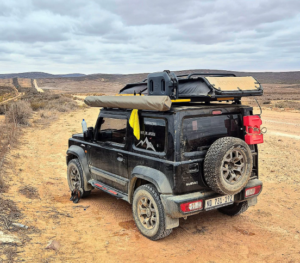Tarlabasi, a patchwork of Istanbul’s migrant communities, comes together during the breaking of the fast, writes Elis Gjevori.
Istanbul, Tarlabasi – “Tarlabasi is the most lonely and forgotten place on earth,” says Eyup Omer Bal sipping his post-iftar tea.
Nestled in the heart of Istanbul and a stone’s throw from Taksim and Cihangir, some of the city’s most prime locations, the Tarlabasi neighbourhood, a sub-province of Beyoglu municipality, is the black sheep, known for its gritty atmosphere and gentrification.
Even Google street view has avoided mapping out this historic but now rundown area which has become a transitory home for migrants both within and outside of Turkey.
If you step off from Istiklal street, Istanbul’s premier shopping street crossing into Tarlabasi Boulevard and enter one of its narrow, sloping alleyways the hustle and bustle of international tourists and capital gives way to an altogether different and less material atmosphere.
To outsiders, it can appear like entering another world as the lights of Taksim fade into the long shadows and mazes that are the streets of Tarlabasi (TAR-la-BASHI). The wash-lined streets full of ageing homes and architectural facades that allude to its more prosperous past in the late 19th century is now more pixelated, with peeling paint, crumbling decor and the heavy musty smell of damp buildings.
A poor and struggling mixed community of Turks, Gypsies, Arabs, Kurds, Pakistanis, Afghans and Africans, Tarlabasi has become a springboard for communities in search of a better life.
For many of the people that move to Tarlabasi from within Turkey, it’s the first stop to settle in Istanbul and move to a better area. For those migrating from outside of Turkey, it is one more stop in their journey to Europe, but many end up calling Tarlabasi their home.
The diversity gives the area a complex but rich tapestry of cultural and ethnic identities, which also cohabit uneasily with each other as the different communities jostle for space in often difficult circumstances.
Eyup Omer Bal and his older brother Kadir started the Tarlabasi Solidarity Group with some friends more than 10 years ago to help the struggling community of migrants and locals.
“People know Nautilus, Capitol, Istiklal street and Taksim,” says Eyup Omar Bal, listing Istanbul’s well-known shopping centres. “They know the famous places; they don’t even know about Tarlabasi, this is a forgotten place. So this is the place to start helping people,” Bal tells TRT World.
“When we come to Tarlabasi in the beginning, we noticed there are many African communities in need, and initially we collected some money to help them,” says Bal.
The nascent organisation embedded itself within the Tarlabasi community and soon found that many migrants who knew little if any Turkish struggled to understand how to access health care. It now boasts of more than 300 volunteers including doctors, teachers, lawyers and students.
“Migrant communities contact us when they have a problem with their landlord, with other locals. You know Tarlabasi can be a dangerous place especially if you are new people,” adds Bal.
The Tarlabasi Solidarity Group’s extensive network of volunteers can provide advice and emergency assistance and advice to Tarlabasi migrant communities free of charge at short notice.
“Ten years ago local people did not want the African communities to stay. However, that was 10 years ago, now people have gotten used to these new faces; mentalities have changed.”
That sense of community is one of many services the Tarlabasi Solidarity Group provides locally, another of which is the weekly iftar – the post-fasting meal of Muslims during the month of Ramadan – it has been providing for 10 years now.
Each Saturday volunteers young and old, within and outside of Tarlabasi gather in one of its many alleyways a short walk from Tarlabasi boulevard to prepare for breaking the fast.
The thatched mats are rolled out on the ground as water and ayran, a yogurt-based beverage is laid out. Wealthy donors provide food. Marinated chicken, sujuk (beef sausage), soup and savory cheese pastries make their way into one of Tarlabasi’s weathered homes ready to be distributed.
Tarlabasi, usually brimming with noise, falls silent at sundown as the call to prayer rings across the neighbourhood’s many minarets, it marks the end of the fast.
A unified call to prayer rings out over Tarlabasi.
Ebu Bekir, a 38-year-old from The Gambia, is one of the volunteers handing out the food and also part of the Tarlabasi Solidarity Group.
The silence of people eating gives way to lively conversations; the background hum of Tarlabasi is back.
It is also an opportunity to get to know people from different walks of life.
Ebu Bekir moved to Tarlabasi four months ago, but he has been in Turkey for more than six years.
Ebu Bekir sells tesbih (prayer beads), necklaces and an assortment of other trinkets in Taksim at night. Many of the people in Tarlabasi make their living from nearby Taksim, which underlines the deeply interconnected yet uneven relationship of this wayward province with its wider, wealthier urban surroundings.
“The Tarlabasi Solidarity Group is one of the associations that came to my aid, by Allah, I was homeless with nothing,” Ebu Bekir says to TRT World.
“The day I met the leaders of the organisation, they helped me so much and made sure I would not live another day outside.”
Step by step, Ebu Bekir has secured his living conditions, he wants to go back to university to study, “with new friends everything is possible,” he adds with a sense of optimism.
“Some of my friends have left to go to Europe, but I believe in making my dream in Turkey,” he says. Tarlabasi is a little less lonely.


